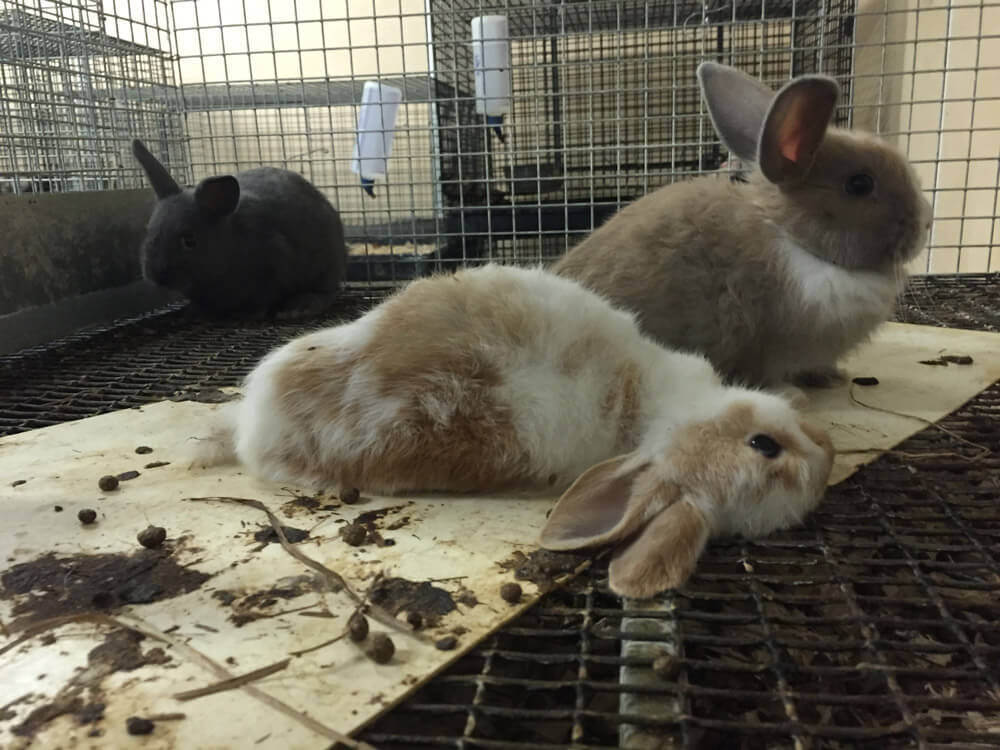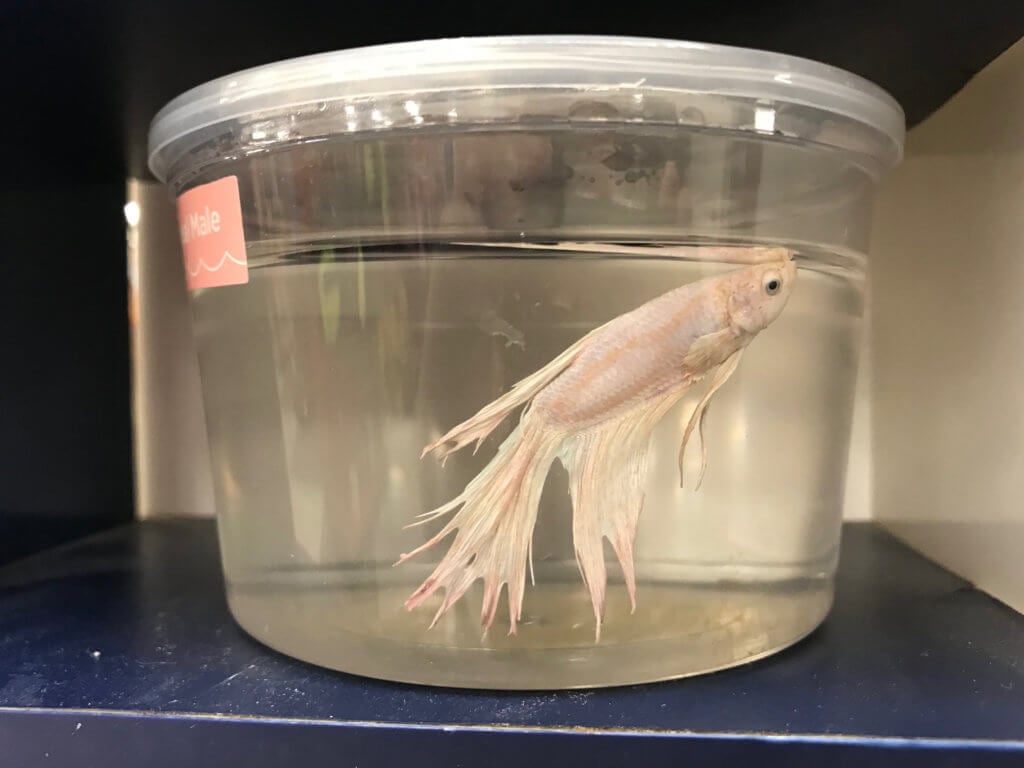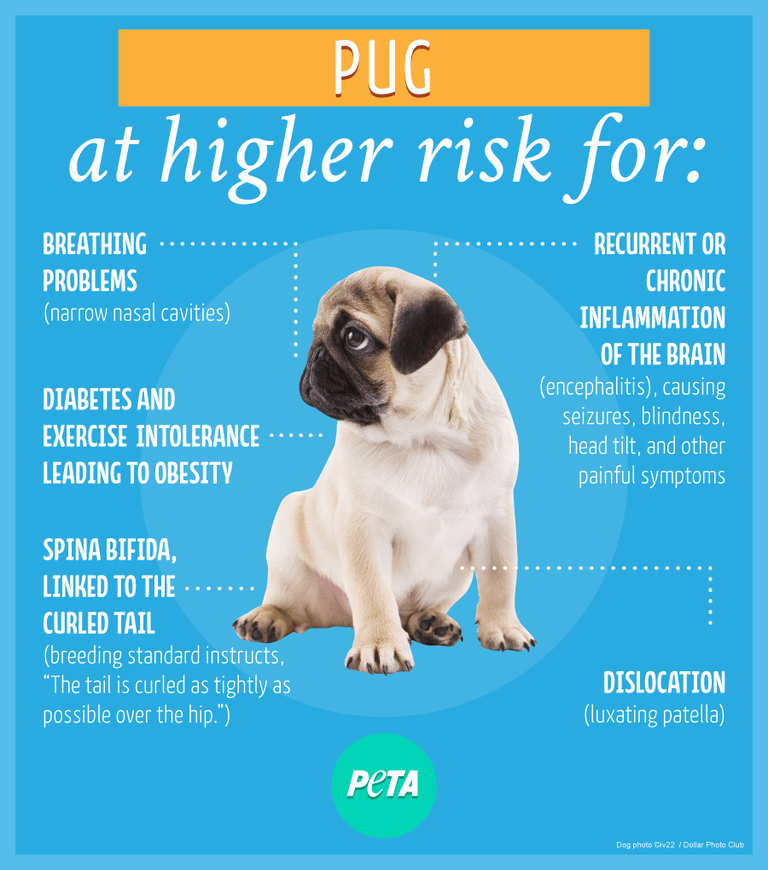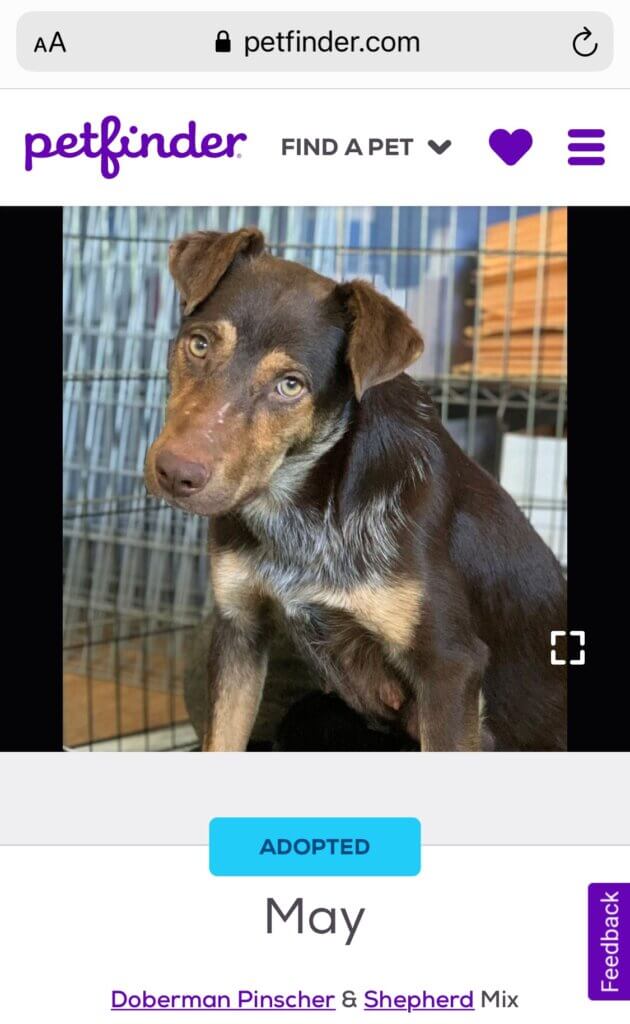Why You Should Never Buy Animals
Pet stores and breeders selling live animals are major players in an uncaring and deadly industry. Treated like disposable merchandise, millions of animals—including birds, fish, cats, dogs, rodents, and reptiles—are born into the pet trade every year. They’re frequently passed off to almost any human willing to pay for them, and the animals often suffer and die. There’s no such thing as responsible breeding, and if someone is profiting from the sale of an animal, you can bet that the animal’s well-being is not the top priority. That’s why PETA is fighting to help all animals in the pet trade. Together, we can break the cycle of breeding and buying that drives our country’s companion animal overpopulation crisis.
The way forward is simple: We must always adopt and never buy animals.
Keep reading to learn more.

The Pet Trade Exposed
Wondering where the animals commonly sold in pet stores come from? The vast majority of them come from suppliers who breed them in crowded, factory farm–like conditions. Animals bred in these facilities are routinely subjected to filth and deprivation. Many endure prolonged, painful deaths without receiving any veterinary care. Those who survive are bought in bulk by pet stores and handed over to anyone with the cash to pay.
PETA has released more than a dozen eye-opening investigations into the pet trade. Each has uncovered neglect, abuse, and immense suffering.
Small Mammals and Reptiles
PETA’s undercover investigations into pet-breeding mills have revealed hellish conditions for small mammals such as gerbils, rabbits, mice, hamsters, and rats. A PETA eyewitness who worked at Holmes Farm—one of seven animal dealers with ties to PetSmart or Petco that we’ve exposed—found that one building’s floor was spattered with blood where helpless prey animals had apparently been attacked by cats, who were allowed to roam freely.
Hamsters continually ran in circles, which can be a sign of severe stress or illness. Some rabbits had less than 1 square foot of living space. A manager grabbed chinchillas by their sensitive tails and tossed hamsters a few feet from one bin to another. Animals commonly had to drink from filthy, contaminated water bowls or were denied water altogether. PETA’s eyewitness discovered hundreds of mice without water, who then drank in a frenzy after the eyewitness provided them with some.

At one reptile-breeding mill in Ohio with connections to PetSmart, tens of thousands of frogs, lizards, turtles, snakes, bearded dragons, and other reptiles were kept at any given time. They were confined to barren, filthy, crowded plastic tubs and deprived of even the most basic necessities, such as heat and UV lamps, veterinary care, fresh food, and even water to drink and soak in.
Betta Fish and Hermit Crabs
Hermit crabs and betta fish—two species commonly sold in souvenir shops as mere trinkets—are captured in their natural habitats and removed from their homes. Sensitive betta fish are also bred en masse on filthy farms in Thailand and crudely shipped halfway around the world in tiny containers. PETA has exposed the shocking misery that these animals endure when sold as “pets” on a global scale.

Additionally, many exotic animals like snakes, lizards, frogs, turtles, sugar gliders, and birds are taken from their native homes and families, shipped on grueling days-long trips over vast distances, and purchased by people who are totally unprepared to meet their unique needs. Many are abandoned or die after enduring malnutrition, loneliness, and the overwhelming stress of confinement.
These animals are wildlife, not “pets,” and they get absolutely no benefit or joy from being held captive in someone’s home.
Birds
There is no effective, enforced federal law protecting birds in the pet trade. They often come from enormous factories where breeders warehouse thousands of parrots and other exotic birds. Large birds, who can live for many decades, are condemned to spend their long, sad lives in dirty, dimly lit cages, where they are unable to stretch their wings fully. Intensive confinement often drives birds mad, as they’re deprived of the outdoors and the freedom they need in order to be healthy. This often results in aggressive, neurotic behavior, including self-mutilation, which is common in birds and other caged animals.
A PETA investigation revealed that a Petland supplier kept sick birds in small, plastic tubs without adequate fresh air. PETA caught a Petsmart and Petco supplier roughly grabbing panicked birds by their heads and wings with no regard to how delicate and sensitive they are.
Large birds, who can live for many decades, are condemned to spend their long, sad lives in dirty, dimly lit cages, where they are unable to fully stretch their wings. Being held captive in a cage often drives birds to madness, since they’re deprived of the outdoors and the freedom they need to be healthy. This often results in aggressive, neurotic behavior, including self-mutilation, which is common in birds and other caged animals.
Dogs and Cats
It’s standard practice for puppy mills to keep animals in cramped, crude, filthy conditions without proper veterinary care or socialization. Female dogs are bred over and over until they can no longer produce puppies. Then, they’re auctioned off or killed. Mothers and their litters often suffer from malnutrition, exposure, and a lack of adequate veterinary care.
Undercover investigations into puppy mills have revealed that dogs often had no bedding or protection from the cold or heat. They were given no regular veterinary care, even when they were ill. Health conditions such as raging ear infections, mange, abscessed feet, and crusty, oozing eyes were all ignored or inadequately treated.
People who breed dogs and cats profit at animals’ expense. Many are bred for appearances that wreak havoc on their health. Dogs and cats don’t care whether their physical appearance conforms to a judge’s standards, but they suffer the consequences of humans’ genetic manipulation. Selective breeding and inbreeding causes painful and life-threatening genetic defects in “purebred” dogs and cats, including crippling hip dysplasia, blindness, deafness, heart defects, respiratory ailments, skin problems, and epilepsy.

Don’t Be Fooled
Some big-name chains, including Petco and PetSmart, highlight their refusal to sell dogs and cats as compassionate. But the small animals who are sold in these big-box pet stores come from breeding mills. Reptiles, rodents, fish, birds, and all others sold there are capable of experiencing fear, stress, and pain, just as cats and dogs are. It’s wrong and speciesist to assume that certain animals deserve less compassion simply because they’re smaller than others.
Problems With Pet Stores
At pet stores, rats, hamsters, reptiles, and other small animals are forced to live in severely crowded boxes, where they often have no choice but to stand on top of each other.
Never buy animals from pet stores.
Pet stores are complicit in the rampant neglect of small animals. They peddle sensitive living beings as if they were trinkets and perpetuate the myth of low-maintenance “starter pets” for children. Pet stores sell animals to anyone who hands over cash or a credit card, without bothering to screen them to ensure that they’ll be responsible guardians. The money they take in helps fund the further breeding and suffering of countless small animals.
All animals have important feelings, needs, and desires—regardless of their size. Most people underestimate what’s involved in caring for the small animals commonly sold in pet stores, who require nutritious food, clean water, comfortable and stimulating environments, veterinary care, and much more.
PETA urges those who are truly ready to provide an animal with a lifetime of attentive care and proper companionship to adopt from a local open-admission shelter or through a responsible adoption group, rather than buying from a breeder or pet store.

Breeders Kill Animals' Chances
Every year in the U.S., more than 6 million lost, abandoned, abused, or unwanted dogs and cats enter animal shelters. Roughly half of them—many healthy, young, and adoptable—must be euthanized because of simple math: There are too many animals and not enough worthy adoptive homes. For every puppy or kitten born in a breeding mill or backyard, an animal awaiting adoption at a shelter loses a chance at finding a home.
Don’t fund this deadly cycle by buying from a breeder.
There’s no such thing as a responsible breeder, and there’s never a need to support their shady businesses financially. Designing dogs to cater to human aesthetics has led to a host of common health problems in many breeds. But even if your heart is set on a certain breed, remember that an estimated 25% of dogs currently in shelters are “purebred.” There are also thousands more waiting in foster homes across the country. You can search for adoptable animals using online resources like Petfinder.

Adopt, Don't Shop!
Dogs, cats, and all other animals are individuals, not property, which is why they should never be bought from pet stores, breeders, online catalogs, or anywhere else. At reputable animal shelters, animals are spayed or neutered before they’re adopted so as not to contribute to the companion animal overpopulation crisis.
PETA encourages people who are certain that they have the time, money, ability, desire, and dedication needed to provide an animal with a lifetime of care to give an animal a second chance at life and love by adopting one from a shelter, rather than supporting the cruel pet trade.
The Vital Importance of Spaying and Neutering
Finding a home for one animal is a wonderful thing, but spaying or neutering one dog or cat potentially spares hundreds of animals suffering and death by preventing generations of puppies and kittens from being born. Getting local spay/neuter laws passed saves even more lives.
This is where our time, energy, and funds are needed most. By adopting and sterilizing, we can drastically reduce—and hopefully end—the homeless-animal crisis and the need for euthanasia because of overpopulation.

Caring for Animal Companions
PETA has long advocated against speciesism and the idea that animals are ours to use. This includes the misguided belief that we can breed, purchase, and otherwise exploit animals in the pet trade. As long as people give monetary support to this cruel and callous industry, animal suffering and homelessness will continue on a massive scale.
That’s why PETA works to reshape the way humans think about animals, right down to the words we use to describe them. We challenge animal-unfriendly idioms, which minimize the amazing things that make animals special or trivialize their suffering. That’s why we don’t call animals “pets” or use “it” in place of personal pronouns when referring to them. It’s important to respect all animals’ personal agency and value those we share our homes with as companions.
There’s no such thing as a “starter pet.”
There’s no such thing as a “starter pet.”
Remember: Even the smallest animals have their own wants, needs, fears, and joys. They aren’t objects for our amusement or property to sell, and they aren’t teaching tools for children. Animals are complex individuals whose emotional and physical well-being must always be considered. Properly caring for any animal companion is a serious and long-term commitment that involves far more work (and money) than most people realize.

If you already have an animal companion, it’s important that you provide them with the best life possible. PETA offers information on caring for a number of species, but it’s crucial that you do thorough research before adopting any animal.
Frequently Asked Questions
PETA has released more than a dozen eye-opening investigations into the pet trade. Each has uncovered neglect, abuse, and immense suffering.
The vast majority of reptiles, fish, rodents, birds, and other small animals sold in pet stores come from suppliers who breed them in crowded, factory farm–like conditions. Animals in these facilities are routinely subjected to filth and deprivation. Many endure prolonged, painful deaths without receiving any veterinary care. Those who survive are often crudely shipped to stores or distributors in tiny containers.[/peta-accordion-item]
Business operators are very reluctant to release data on mortality rates during the various steps of the supply chain. However, PETA’s undercover investigations have proved that dead, sick, and neglected animals are an inherent part of the pet trade.
Our investigation into U.S. Global Exotics, one of the largest sellers of exotic animals to pet stores around the world, revealed that tens of thousands of animals suffered terribly in severely crowded and filthy enclosures. More than 26,000 animals were seized by officials as a result of our findings, and hundreds were found dead at the site. Facilities like this are the rule—not the exception. As long as people support the cruel pet trade, these businesses will continue operating.[/peta-accordion-item]
On any given day in the U.S., an estimated 70 million homeless dogs and cats are struggling to survive. Some were abandoned—left behind or dropped by the side of the road when their owners could no longer care for them or just didn’t want them anymore. Many were born on the streets, where they face being hit by cars, are vulnerable to attacks by other animals and cruel humans, and can contract, spread, and suffer and die from various ailments and diseases.
Each year, only around 10% of the massive homeless-animal population ever makes it to animal shelters, where hopefully they can find safety and comfort, receive treatment for minor medical conditions, and be assessed for adoption into a new home. Of the millions of animals who enter shelters each year, about half must be euthanized in order to alleviate their suffering or because no suitable homes exist for them. And for the tens of millions of animals fending for themselves, simple infections left untreated can become deadly and internal and external parasites can eat them alive. They freeze in the winter and suffer from heat exhaustion when temperatures soar in the summer.[/peta-accordion-item][/peta-accordion]
“What can I do to help?”
We must not deny that an overpopulation crisis exists or vilify those who have devoted their lives to animal sheltering. No one wants to see healthy animals euthanized. Thankfully, there are action steps you can start taking today to help end companion animal homelessness:
- Never buy! If you’re ready to welcome an animal into your home, adopt from an animal shelter or a reputable, trusted foster or adoption program. Urge your friends, family, and social media followers to do the same.
- Have your animal companions spayed or neutered, and don’t support breeders. There are already millions of healthy, adoptable animals in shelters looking for homes. As wonderful as it would be for the homeless-animal crisis to disappear overnight, it won’t begin to abate as long as breeding continues unchecked.
- Never buy anything—not even a leash or a bag of treats—from a store that sells animals. Patronize stores that sell pet supplies only!
- If you have an animal companion, make sure you’re giving them the best possible life.
Below, you can take action for animals suffering in the pet trade. Our quick and effective rapid-action tool allows anyone to fire off messages to leaders of influential companies and organizers of large events. With the click of a button, you can complete multiple PETA action alerts and speak up for countless animals in mere seconds.

Take Action for Animals!
There are multiple opportunities to help. As soon as you take one action below, another will automatically appear in its place.
Just enter your information once, then keep clicking the “Send Message” button until you’ve completed them all. Once you’ve finished, be sure to share this page with your friends, family members, and social media followers. Encourage them to join you in helping to stop the abuse of animals in the pet trade.